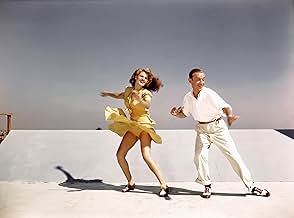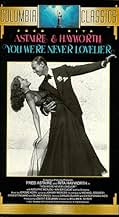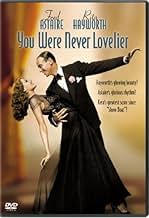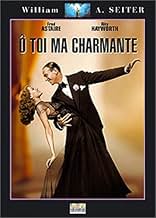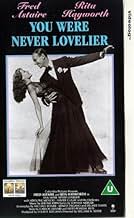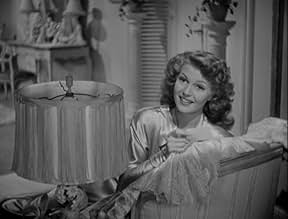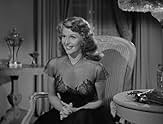IMDb-BEWERTUNG
7,1/10
4377
IHRE BEWERTUNG
Füge eine Handlung in deiner Sprache hinzuIn Buenos Aires, a man who has decreed that his daughters must marry in order of age allows an American dancer to perform at his club under the condition that he play suitor to his second-ol... Alles lesenIn Buenos Aires, a man who has decreed that his daughters must marry in order of age allows an American dancer to perform at his club under the condition that he play suitor to his second-oldest daughter.In Buenos Aires, a man who has decreed that his daughters must marry in order of age allows an American dancer to perform at his club under the condition that he play suitor to his second-oldest daughter.
- Für 3 Oscars nominiert
- 3 Nominierungen insgesamt
Kirk Alyn
- Julia's Groom
- (Nicht genannt)
Desi Arnaz
- Band Singer
- (Nicht genannt)
Larry Arnold
- Wedding Guest
- (Nicht genannt)
William A. Boardway
- Wedding Guest
- (Nicht genannt)
Stanley Brown
- Roddy - Cecy's Boyfriend
- (Nicht genannt)
George Bunny
- Flower Man
- (Nicht genannt)
James Carlisle
- Wedding Guest
- (Nicht genannt)
Jack Chefe
- Nightclub Patron
- (Nicht genannt)
Empfohlene Bewertungen
Rita Hayworth is supposed to have said that "men went to bed with Gilda and woke up next to me," and that was her problem with men. Never having had the opportunity to go to bed with Rita Hayworth, I can't say what would have happened to me, but I can tell you that Maria Acuña would have been more on my mind than Gilda. She and Fred virtually float whenever they dance together, and I think it takes nothing away from Ginger Rogers to say that. It wasn't until I saw this film that I realized what the big deal about Rita Hayworth was all about. Her character in this film, and the character's dancing, is not only gorgeous, but has an insouciance that no other partner of Fred's possessed. Just watching the "I'm Old Fashioned" dance routine, which has hardly any edits in it, and watching Rita and Fred kick the French doors shut is worth the price of admission.
Others have commented about the plot of this film--I don't think we need to go into it here other than to say it's a pretty typical boy meets girl, boy gets girl, boy loses girl, boy jumps through hoops, boy gets girl back plot. Only three members of the supporting cast really have much to do: Adolphe Menjou as the Maria's curmudgeon father moves the plot along and demonstrates why he was known as "the best-dressed man in Hollywood," even in a kilt, Xavier Cugat and His Orchestra provide a Latin beat, and Cugie gets to demonstrate his skill as a caricaturist. Gus Schilling, as Menjou's rather fey secretary, has to perform a number of tasks that were filled by as many as four actors in the Fred and Ginger films: the "Helen Broderick" comedienne role, the "Victor Moore" sidekick role, and whatever roles were assigned to Eric Blore and Eric Rhodes. I suppose when Schilling was cast Eric Blore was somewhere in the back of someone's mind at Columbia (although Franklin Pangborn also comes to mind). Schilling does a commendable job. The rest of the cast is competent but really doesn't do much to move the plot along. But this is a musical, and the job of all the characters who don't sing and dance, and even some who do, are there simply to move the plot along. The folks lining up at the box office were there to see Fred and Rita dance and to hear Fred and Nan Wynn (I wonder what Rita's singing sounded like) sing.
I just watched the recent DVD of this film, and it's a technical knockout. The print looks like it just came off the truck from Columbia for a first run, and the soundtrack is sharp. It also reveals that Rita Hayworth did NOT have great-looking legs like, say Marlene Dietrich or Lucille Ball. One thing that I did realize, though, is that this, like my favorite Fred-and-Ginger, "Swing Time," features songs by Jerome Kern--here with lyrics by Johnny Mercer, in "Swing Time" with lyrics by Dorothy Fields, and that in both films Fred plays a guy who doesn't really LIKE to dance: he sees his vocation as gambling, and only resorts to dancing to pay the bills when he's down on his luck.
This musical makes my "top ten" list of Hollywood musicals, which includes, by the way, any musicals made through 2006. Here they are, in no particular order:
1. "Swing Time" 2. "Show Boat" (with Allan Jones , Charles Winninger, and Irene Dunne, directed by James Whale: emphatically NOT the MGM bomb!) The title sequence to this film is one of the most original of all time. 3. "You Were Never Lovelier" 4. "Shall We Dance" (Fred & Ginger, not the delightful Japanese film) 5. "Oklahoma!" 6. "Top Hat" 7. "The Gay Divorcée" 8. "The Wizard of Oz" 9. "Guys and Dolls" 10. "The Gang's All Here" (Busby Berkeley's biggest production, featuring "The Lady in the tutti- Fruitti Hat") 11. "State Fair," the original "Iowa"version, please 12. "Love Me Tonight" (OK, so there are 12 in the top ten, but 11 is the only film that Rodgers and Hammerstein put together, and it has great songs. as well as Charles Winninger, and 12 has an interesting presentation from Rouben Mamoulian and a great score from Rodgers and Hart.)
Once again, these are listed in no particular order. It should be noted that only "The Wizard of Oz" comes from "the legendary Freed unit" at MGM. Perhaps someday IMDb will publish my yet-to-be-written "why MGM Musicals Suck" essay, but here's one point: All of the films listed above either were written AS movie musicals, or took a Broadway hit and used the power of film to render the book and songs more vividly. "Oklahoma!" is perhaps the best example of that, as opposed to the dismal MGM adaptation of Leonard Bernstein's wonderful "On The Town," which only proves, as do so many other MGM musicals, that Roger Edens may have been a good arranger but as a songwriter he left a lot to be desired--which didn't stop MGM from hacking almost all of the Bernstein-Comden-Green songs out of the movie. It doesn't explain why none of Busby Berkeley's best work came from MGM, but that's a story for another day.
Back to "You Were Never Lovelier:" Irving Berlin said that when he wrote songs he heard Fred Astaire singing them, which is something we should remember: Astaire was not only a great dancer, but a great song stylist who introduced a big chunk of the Great American Song Book. This is a wonderful film that does exactly what it's supposed to do: delight us and lift our spirits.
Others have commented about the plot of this film--I don't think we need to go into it here other than to say it's a pretty typical boy meets girl, boy gets girl, boy loses girl, boy jumps through hoops, boy gets girl back plot. Only three members of the supporting cast really have much to do: Adolphe Menjou as the Maria's curmudgeon father moves the plot along and demonstrates why he was known as "the best-dressed man in Hollywood," even in a kilt, Xavier Cugat and His Orchestra provide a Latin beat, and Cugie gets to demonstrate his skill as a caricaturist. Gus Schilling, as Menjou's rather fey secretary, has to perform a number of tasks that were filled by as many as four actors in the Fred and Ginger films: the "Helen Broderick" comedienne role, the "Victor Moore" sidekick role, and whatever roles were assigned to Eric Blore and Eric Rhodes. I suppose when Schilling was cast Eric Blore was somewhere in the back of someone's mind at Columbia (although Franklin Pangborn also comes to mind). Schilling does a commendable job. The rest of the cast is competent but really doesn't do much to move the plot along. But this is a musical, and the job of all the characters who don't sing and dance, and even some who do, are there simply to move the plot along. The folks lining up at the box office were there to see Fred and Rita dance and to hear Fred and Nan Wynn (I wonder what Rita's singing sounded like) sing.
I just watched the recent DVD of this film, and it's a technical knockout. The print looks like it just came off the truck from Columbia for a first run, and the soundtrack is sharp. It also reveals that Rita Hayworth did NOT have great-looking legs like, say Marlene Dietrich or Lucille Ball. One thing that I did realize, though, is that this, like my favorite Fred-and-Ginger, "Swing Time," features songs by Jerome Kern--here with lyrics by Johnny Mercer, in "Swing Time" with lyrics by Dorothy Fields, and that in both films Fred plays a guy who doesn't really LIKE to dance: he sees his vocation as gambling, and only resorts to dancing to pay the bills when he's down on his luck.
This musical makes my "top ten" list of Hollywood musicals, which includes, by the way, any musicals made through 2006. Here they are, in no particular order:
1. "Swing Time" 2. "Show Boat" (with Allan Jones , Charles Winninger, and Irene Dunne, directed by James Whale: emphatically NOT the MGM bomb!) The title sequence to this film is one of the most original of all time. 3. "You Were Never Lovelier" 4. "Shall We Dance" (Fred & Ginger, not the delightful Japanese film) 5. "Oklahoma!" 6. "Top Hat" 7. "The Gay Divorcée" 8. "The Wizard of Oz" 9. "Guys and Dolls" 10. "The Gang's All Here" (Busby Berkeley's biggest production, featuring "The Lady in the tutti- Fruitti Hat") 11. "State Fair," the original "Iowa"version, please 12. "Love Me Tonight" (OK, so there are 12 in the top ten, but 11 is the only film that Rodgers and Hammerstein put together, and it has great songs. as well as Charles Winninger, and 12 has an interesting presentation from Rouben Mamoulian and a great score from Rodgers and Hart.)
Once again, these are listed in no particular order. It should be noted that only "The Wizard of Oz" comes from "the legendary Freed unit" at MGM. Perhaps someday IMDb will publish my yet-to-be-written "why MGM Musicals Suck" essay, but here's one point: All of the films listed above either were written AS movie musicals, or took a Broadway hit and used the power of film to render the book and songs more vividly. "Oklahoma!" is perhaps the best example of that, as opposed to the dismal MGM adaptation of Leonard Bernstein's wonderful "On The Town," which only proves, as do so many other MGM musicals, that Roger Edens may have been a good arranger but as a songwriter he left a lot to be desired--which didn't stop MGM from hacking almost all of the Bernstein-Comden-Green songs out of the movie. It doesn't explain why none of Busby Berkeley's best work came from MGM, but that's a story for another day.
Back to "You Were Never Lovelier:" Irving Berlin said that when he wrote songs he heard Fred Astaire singing them, which is something we should remember: Astaire was not only a great dancer, but a great song stylist who introduced a big chunk of the Great American Song Book. This is a wonderful film that does exactly what it's supposed to do: delight us and lift our spirits.
Fred Astaire's films are all pretty much the same: quaint romantic hijinks driving a ridiculous but entertaining screwball plot. By the 1940s, he and Ginger Rogers had parted ways (at least until 'The Barkleys of Broadway (1949)'), and the studios were left to find him a suitable new partner. RKO's first experiment, opposite Joan Fontaine in 'A Damsel in Distress (1937),' had been far less than successful, as much as I love Joan Fontaine. Astaire's best prospects came from a lovely young lady named Rita Hayworth, with whom he starred in 'You'll Never Get Rich (1941)' and 'You Were Never Lovelier (1942).' Ah, Rita Hayworth! (Forgive me while I regain my train of thought). This comedy musical, directed by William A. Seiter, features the same unlikely romantic mix-ups you'd expect to find in a Fred and Ginger movie of the 1930s. In fact, the director had previously made 'Roberta (1935),' and he improves upon that film.
Eduardo Acuña (Adolphe Menjou) is a man very much used to getting his own way. Determined that his second daughter Maria (Hayworth) should fall in love, he begins writing her anonymous love letters, only for her to mistake American dancer Bob Davis (Astaire) for her nameless romantic suitor. Bob reluctantly agrees to carry on the deception, but soon falls for Maria himself. It doesn't take a genius to guess where this is going, but, like Astaire's previous films, it is well worth watching for the marvellous chemistry of the two leads. Put simply, Hayworth is endlessly, stunningly, ravishingly gorgeous. Though Ginger Rogers' exquisite comedic timing is noticeably absent (leaving Fred to take up the comedic slack), every scene with Hayworth is spent in breathtaking company. And she's not just a pretty face: the young actress is a very talented dancer, keeping up with Astaire step-for-step.
Eduardo Acuña (Adolphe Menjou) is a man very much used to getting his own way. Determined that his second daughter Maria (Hayworth) should fall in love, he begins writing her anonymous love letters, only for her to mistake American dancer Bob Davis (Astaire) for her nameless romantic suitor. Bob reluctantly agrees to carry on the deception, but soon falls for Maria himself. It doesn't take a genius to guess where this is going, but, like Astaire's previous films, it is well worth watching for the marvellous chemistry of the two leads. Put simply, Hayworth is endlessly, stunningly, ravishingly gorgeous. Though Ginger Rogers' exquisite comedic timing is noticeably absent (leaving Fred to take up the comedic slack), every scene with Hayworth is spent in breathtaking company. And she's not just a pretty face: the young actress is a very talented dancer, keeping up with Astaire step-for-step.
It would have been nice had this not been World War II and we could actually have done this film in Buenos Aires. As it is, except for a few newsreel shots at the beginning of the film, this might as well have taken place in San Diego.
Having said that this tinsel of a story is put over by the charm and beauty of its two leads, Fred Astaire and Rita Hayworth. Not to mention a good supporting cast led by Adolphe Menjou who is busy poaching on the preserve of Hollywood cranky fathers usually inhabited by folks like Eugene Palette and George Barbier.
Menjou's got some strange ideas. He wants to see his daughters get married, but in descending order. Rita is number two daughter and she's holding things up for three and four. Of course numbers three and four have fiancés panting at the bit.
Through the usual comedy of errors that are prevalent in Fred Astaire movies, Menjou's conceived a dislike for Fred and Rita's seeing something in him. How will it all work out?
Astaire movies always have flimsy or silly plot lines, but they have him and an attractive female partner dancing to some of the best music ever written for the screen. And when it's Jerome Kern's music, it don't get much better than that.
And the dancing partners don't get more talented than Rita Hayworth. She is positively radiant in this film. And she and Fred dance divinely to one of my favorite Jerome Kern ballads, I'm Old Fashioned.
Reason enough to see this film.
Having said that this tinsel of a story is put over by the charm and beauty of its two leads, Fred Astaire and Rita Hayworth. Not to mention a good supporting cast led by Adolphe Menjou who is busy poaching on the preserve of Hollywood cranky fathers usually inhabited by folks like Eugene Palette and George Barbier.
Menjou's got some strange ideas. He wants to see his daughters get married, but in descending order. Rita is number two daughter and she's holding things up for three and four. Of course numbers three and four have fiancés panting at the bit.
Through the usual comedy of errors that are prevalent in Fred Astaire movies, Menjou's conceived a dislike for Fred and Rita's seeing something in him. How will it all work out?
Astaire movies always have flimsy or silly plot lines, but they have him and an attractive female partner dancing to some of the best music ever written for the screen. And when it's Jerome Kern's music, it don't get much better than that.
And the dancing partners don't get more talented than Rita Hayworth. She is positively radiant in this film. And she and Fred dance divinely to one of my favorite Jerome Kern ballads, I'm Old Fashioned.
Reason enough to see this film.
...and Fred Astaire was never as boyishly charming as he is here. This is a lovely, escapist, feel-good musical made in the early 40's to appease WW2-weary audiences. This is Rita and Fred's second (and final) outing after the surprise success of 'You'll Never Get Rich', and, while the first film was very enjoyable, this is an improvement on it's predecessor.
Hayworth shines as the girl who's not very interested in marriage until a 'secret admirer' and Fred Astaire come into the picture. She's very beautiful and glamorous in the role; the 'Cansino-to-Hayworth' transformation was going along nicely at the film's time of release. Astaire is always very appealing, and he does light comedy quite well. This hs a far sharper script than 'You'll Never Get Rich' and benefits from the non-wartime backdrop. Yes, the war was going on when Rita and Fred were making dancing magic, but you'd never know it from the happy little self-contained vacuum that Columbia creates for the pair in a story meant to be set in exotic South America.
I guess Rita, with her Latin roots, was the perfect choice for Maria, and she manages to outdo the master Astaire in the Latino-inspired dance routines. Her singing is dubbed, but Rita's dancing is sublime and her acting is very effective.
This film also has more memorable songs than the 1941 Astaire-Hayworth outing (I don't particularly like to compare, but it's hard not to), with 'You Were Never Lovelier', 'Shorty George' and 'I'm Old Fashioned' being great tunes. 'Shorty George' entranced me so much that I re-played the sequence on DVD three times before I moved forward in the film!
It doesn't have much of a plot, but we know that Astaire's musicals were always light on this factor so we can be forgiving. What it does have is a perfect, innocent sweetness that cannot possibly be recaptured today. From early scenes with Astaire trying to make conservation with a haughty Rita, to the final scene where the awkward yet lovable Fred arrives as Rita's 'knight in shining armor' on a white horse, 'You Were Never Lovelier' is just...well, lovely.
8/10.
Hayworth shines as the girl who's not very interested in marriage until a 'secret admirer' and Fred Astaire come into the picture. She's very beautiful and glamorous in the role; the 'Cansino-to-Hayworth' transformation was going along nicely at the film's time of release. Astaire is always very appealing, and he does light comedy quite well. This hs a far sharper script than 'You'll Never Get Rich' and benefits from the non-wartime backdrop. Yes, the war was going on when Rita and Fred were making dancing magic, but you'd never know it from the happy little self-contained vacuum that Columbia creates for the pair in a story meant to be set in exotic South America.
I guess Rita, with her Latin roots, was the perfect choice for Maria, and she manages to outdo the master Astaire in the Latino-inspired dance routines. Her singing is dubbed, but Rita's dancing is sublime and her acting is very effective.
This film also has more memorable songs than the 1941 Astaire-Hayworth outing (I don't particularly like to compare, but it's hard not to), with 'You Were Never Lovelier', 'Shorty George' and 'I'm Old Fashioned' being great tunes. 'Shorty George' entranced me so much that I re-played the sequence on DVD three times before I moved forward in the film!
It doesn't have much of a plot, but we know that Astaire's musicals were always light on this factor so we can be forgiving. What it does have is a perfect, innocent sweetness that cannot possibly be recaptured today. From early scenes with Astaire trying to make conservation with a haughty Rita, to the final scene where the awkward yet lovable Fred arrives as Rita's 'knight in shining armor' on a white horse, 'You Were Never Lovelier' is just...well, lovely.
8/10.
Jerome Kern lovely music is what gives this film LIFE! And the fact that Rita Hayworth and Fred Astaire are fantastic in this film.
Fred Astaire was one of the best dancers in motion picture history. But, not a lot of people know that, Rita Hayworth was a very talented dancer too. And believe me, she puts her skills to work in this film.
Now...I'm not going to lie, it's not the best storyline and the acting isn't the best. Although (Adolphe Menjou) really keeps the film going with his short temper and wit.
Robert Davis (Fred Astaire) is a well known dancer who tries to get a contract at Eduardo Acuna (Adolphe Menjou) night club, but he's not having any luck at all.
Through some very insane events Robert and Maria Acuna (Rita Hayworth) begin to have feeling for one another. But her father Eduardo Acuna doesn't want his daughter messing around with a dancer.
But with a number of wonderful tunes and some great moves 'Love' wins-out in the end.
It's a fun little film that all of you will enjoy...You Were Never Lovelier.
Fred Astaire was one of the best dancers in motion picture history. But, not a lot of people know that, Rita Hayworth was a very talented dancer too. And believe me, she puts her skills to work in this film.
Now...I'm not going to lie, it's not the best storyline and the acting isn't the best. Although (Adolphe Menjou) really keeps the film going with his short temper and wit.
Robert Davis (Fred Astaire) is a well known dancer who tries to get a contract at Eduardo Acuna (Adolphe Menjou) night club, but he's not having any luck at all.
Through some very insane events Robert and Maria Acuna (Rita Hayworth) begin to have feeling for one another. But her father Eduardo Acuna doesn't want his daughter messing around with a dancer.
But with a number of wonderful tunes and some great moves 'Love' wins-out in the end.
It's a fun little film that all of you will enjoy...You Were Never Lovelier.
Wusstest du schon
- WissenswertesBecause all the sets on the Columbia lot were occupied, Fred Astaire and Rita Hayworth rehearsed most of their routines in the nearby Hollywood Cemetery funeral parlor. They had to stop rehearsing to the upbeat music whenever a funeral procession arrived.
- PatzerWhen Maria and Mrs. Castro meet Robert in the sky room, Maria holds her overcoat lapels with both hands. Between shots she appears with both her arms hanging.
- Zitate
Mrs. Delfina Acuña: I wish you wouldn't speak while I'm interrupting.
- Crazy CreditsIn the opening credits, the two film stars and the movie title appear on the front and back of a flower gift card held in the hands of a glamorous woman. The rest of the credits follow as in normal film credits.
- VerbindungenFeatured in Rocket Gibraltar (1988)
- SoundtracksYou Were Never Lovelier
(1942) (uncredited)
Music by Jerome Kern
Lyrics by Johnny Mercer
Played during the opening credits and often as background music
Played by Xavier Cugat and His Orchestra and sung by Fred Astaire
Danced by Fred Astaire and Rita Hayworth at the anniversary party
Danced by Fred Astaire and Rita Hayworth at the end and sung by an offscreen chorus
Top-Auswahl
Melde dich zum Bewerten an und greife auf die Watchlist für personalisierte Empfehlungen zu.
- How long is You Were Never Lovelier?Powered by Alexa
Details
- Erscheinungsdatum
- Herkunftsland
- Sprache
- Auch bekannt als
- You Were Never Lovelier
- Produktionsfirma
- Weitere beteiligte Unternehmen bei IMDbPro anzeigen
Box Office
- Bruttoertrag in den USA und Kanada
- 672.900 $
- Laufzeit
- 1 Std. 37 Min.(97 min)
- Farbe
- Seitenverhältnis
- 1.37 : 1
Zu dieser Seite beitragen
Bearbeitung vorschlagen oder fehlenden Inhalt hinzufügen


